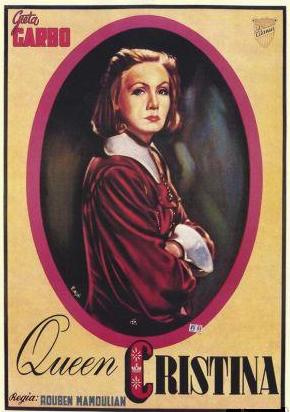
QUEEN CHRISTINA
US, 1933, 97 minutes, Black and white.
Greta Garbo, John Gilbert, Ian Keith, Lewis Stone, C. Aubrey Smith, Reginald Owen.
Directed by Rouben Mamoulian.
Queen Christina is one of the classic Greta Garbo films. She stars with John Gilbert with whom she had made a number of films – but whose career faltered because his voice did not suit sound film-making.
The film focuses on the young Christina of Sweden who became queen at the age of five. Action takes place in the 17th century. The politics of Sweden at the time, which was emerging as a dominant nation, are complicated by the aftermath of the Reformation. Christina herself is torn in her religious affiliations.
The Thirty Years War ended in 1648. Sweden was an important power in north-western Europe – and Christina is pressured into marrying her cousin. However, she falls in love with an ambassador from Spain and Sweden cannot understand that she could even contemplate marrying a Catholic.
Christina had to abdicate and retired to Rome. The film is immortalised in the famous still with Greta Garbo as Christina on the bow of the ship looking towards her homeland.
Greta Garbo was at the height of her powers in the 1930s with a range of films including Grand Hotel the year before Queen Christina. Within ten years she was to make her last film, Two- Faced Woman.
Rouben Mamoulian made a number of films with great flair from social comedies to action dramas, especially in the 1940s with The Mark of Zorro. Queen Christina’s story was told in the 1974 film The Abdication with Liv Ullman as Queen Christina.
1. The appeal of historical costume drama? The appeal of the love story? The film as a Greta Garbo vehicle?
2. Comment on the technical style of the early thirties, the use of sets for the court, snow settings, the inn, the final ship? The musical background? The status of the stars, especially Garbo and John Gilbert and audience expectations of a romance? The impact of these aspects In later decades?
3. The film’s building up a background of Sweden in the seventeenth century, the nature of the political conflicts, Sweden and its status in Europe and European politics, the religious repercussions of the Reformation and the religious wars? The impact on Sweden?
4. Audience response to Christina and her role as Queen of Sweden? The importance of the sequence of the child In the court? Her poise as a child, her adult kind of dignity, royal manners? Her control of the court? Its atmosphere? The influence of her father, the influence of her main adviser? The nature of her training as a child to be Queen?
5. How much control did her main adviser have over her? Where did he influence her? Especially the questions of marriage and diplomacy?
6. How did Christina grow up? As a woman, her place in her family, her role as a queen and in government? Her friendship with her cousin, with Karl Magnus, with the other suitors? Her emotional life and the questions of marriage? Her decision not to marry and to be Queen? Her yearning for a personal life? Did the film and Garbo’s performance show the complexities of this isolated monarch?
7. Queen Christina and her private life, as a woman? Her reading in bed, her vigorous way of life, washing in the snow? Her vigorous riding? Was she a credible Queen?
8. The portrayal of court life, the nobles, the clergy, the commons? Their positions in the court? Their advice about her marriage? Christina’s independence towards each group?
9. The importance of the betrayal of the cousin and Christina’s attitudes and forgiveness? Her snow holiday and its exhilaration?
10. Audience preparation for the arrival of the Spaniards? The contrast of the Spanish outlook in terms of politics and religion, even in climate? The humour of the first meeting with Antonio? The broken coach and the gallantry?
11. The irony of the discussion about the Queen's reputation? People’s attitude towards her and the enumeration of her lovers? The sequences at the inn and Christina’s pursuit of the deception? The friendship between Antonio and Christina as man-to-man?
12. The gradual build-up of the romantic night of Christina and Antonio? Their talk, falling in love, the effect on each? The depth of Antonio’s love in a casual encounter? Christina’s valuing of Antonio’s love?
13. The preparations and audience anticipation of the encounter at court? Christina’s changing her clothing becoming more feminine? The amazement of Antonio and his being hurt? The reconciliation and the blossoming of their love?
14. The contrasting background of Intrigue, the riots in the street, the invasion of the palace and Christina’s quelling of the mobs? Her regality?
15. How dramatic was the presentation of the abdication? The questions about her succession, the successors? The impact on her adviser, on the nobles on the commons? The ceremonies of her giving up the emblems of state, her procession away from the court? The motivations for her choice, the implications, the difficulties?
The freedom that followed?
16. The irony of the duel and Antonio’s involvement in his defeat? The contrast with Christina’s exhilaration and rushing towards the ship?
17. How much sentiment and pathos did the film invest in Antonio’s death scene? The impact of Christina? Her future without Antonio? A wandering Queen?
18. Critics have commented on the dramatic ending of the films the ship and Christina looking out from the ship? How appropriate an ending for this kind of film? What was the audience left with?